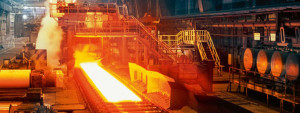 The Italian metallurgy industry is trying to success in the Turkish market, one that is extremely interesting with significant potential. It will launch its bid at the Ankiros 2014 trade fair , which takes place in Istanbul till 13 September. The Italian mission, consisting of 10 companies coordinated by ICE – the Italian Trade Promotion Agency, in collaboration with the trade association Amafond, will be aiming first and foremost to highlight its strong points: the excellence of the quality and the technology along with the flexibility and attention paid to customers. It will do so by showcasing its best products, in a dedicated area of 220 square meters. These will include presses, products and support material for non-ferrous alloy foundries as well as equipment used for the melting of precious metals in the gold and silver industry and so much more as well. Everything, in other words, will focus on introducing innovations in the sector and winning over shares of the market in Turkey and in neighbouring countries, as well as building on what already exists. On the other hand, the Ankiros 2014 trade fair also appears to provide just the right opportunity for getting to know and having discussions with other operators and those working in the sector: the previous edition, which like this year, coincided with two other events, i.e.
The Italian metallurgy industry is trying to success in the Turkish market, one that is extremely interesting with significant potential. It will launch its bid at the Ankiros 2014 trade fair , which takes place in Istanbul till 13 September. The Italian mission, consisting of 10 companies coordinated by ICE – the Italian Trade Promotion Agency, in collaboration with the trade association Amafond, will be aiming first and foremost to highlight its strong points: the excellence of the quality and the technology along with the flexibility and attention paid to customers. It will do so by showcasing its best products, in a dedicated area of 220 square meters. These will include presses, products and support material for non-ferrous alloy foundries as well as equipment used for the melting of precious metals in the gold and silver industry and so much more as well. Everything, in other words, will focus on introducing innovations in the sector and winning over shares of the market in Turkey and in neighbouring countries, as well as building on what already exists. On the other hand, the Ankiros 2014 trade fair also appears to provide just the right opportunity for getting to know and having discussions with other operators and those working in the sector: the previous edition, which like this year, coincided with two other events, i.e.
Annofer and Turkcast, saw the presence of 850 exhibitors from 39 different countries around the world, and was attended by more than 15 thousand visitors. This year organisers and participants alike are hoping that numbers will rise, given that the metallurgy sector is deemed to be of strategic importance at this moment in Turkey. In the land of the Bosphoros in particular the foundry sector has a vast range of applications in construction; mechanical engineering; the automotive industry and transportation in general. Production stands at around one and a half million tonnes per year and there are a total of 300 foundries and 1000 workshops that employ around 22,000 people. The major factories are located in different areas, and in particular in the region of Marmara, the Aegean and in the Central Anatolia region. The development of the user industry – primarily the automotive industry – and the construction and commissioning of major gas pipeline and rail projects, has led to a need to modernise plants. Some time ago the local foundries launched significant programs of technological renewal, turning mainly to foreign suppliers to purchase the machinery and equipment needed.



